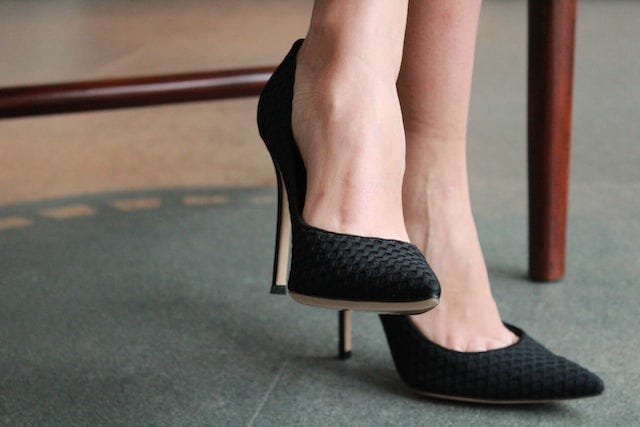For many years, both digital and print media have encouraged women to engage in self-care. The content always lists and discusses a variety of activities women could indulge in as acts of self-care. The activities include things like manicures, solo weekend trips, day spa dates with girlfriends, high-end skincare products, yoga, bath bombs — and on and on and on.
Granted, some of the self-care advice talks about low- or no-cost activities, such as picking flowers, taking a hot bath, going for a walk, etc. The problem is that self-care — or ‘me time’ as experienced self-carers call it — has become hitched to all manner of self indulgences.
Just bought a pair of $300 shoes? Self care!
Cut people out of your life who don’t make you ‘happy’? Self care!
Lunch reservations for you and five of your closest friends? Self care!
Look, I get it. I really do. I get the expensive shoes, the new ski outfit (even though I have you have a perfectly good one in your closet), the mani-pedi, the long hot bubble bath with champagne. the Botox. I enjoy treats like this too. But that’s what they are — treats.
Don’t men need self-care too?
Unfortunately, the self-care craze has morphed into unbridled permission to pamper oneself because…well…you deserve it girlfriend. Now go slay! (Insert eye roll here)
Why don’t we ever see things directly marketed to men as self-care? I’ve thought about this a lot. Could it be that the marketing people know that women spend far more money, in general, on these things than men do? That’s my guess. Men don’t respond to that marketing angle. In short, men buy and women shop.
“Women are happy to meander through sprawling clothing and accessory collections or detour through the shoe department. They like to glide up glass escalators past a grand piano, or spray a perfume sample on themselves on their way to, maybe, making a purchase. For men, shopping is a mission. They are out to buy a targeted item and flee the store as quickly as possible, according to new Wharton research.” [Linked above]
Men go to the store with something in particular in mind, they buy it, and they leave. Why? According to the study, it’s because they “want to do something else.” Absolutely nothing wrong with that!
It’s unpopular to say nowadays, but men sacrifice far more than most people in our post-Christian culture realize. Our society maligns and bears false witness against them at any opportunity. But that, my friends, is for a future post.
What self-care is and what it is not
Perhaps when the idea of self-care first became popular, the concept was more wholesome (though I doubt it), but it has now become a sort of psy-op. The hidden message being something along the lines of, “Pamper yourself to escape the chaos of everyday life.”
And to clarify: Please don’t conflate the idea of ‘self-care’ with things like regular exercise, eating healthily, bathing, or downtime. You should be doing this anyway!
Getting your ‘fix’ of self-indulgence can quickly spiral out of control and could even result in health issues and financial stress. But beneath any visible manifestations — over-indulgence has the potential to create serious psychological and relational consequences.
The big takeaway from this is that the thrill and satisfaction that rides in with a self-indulgent act isn’t lasting. Years ago, a wise older friend likened it to “putting bandaids on bullet wounds.”
If not self-care, as marketed, then what?
I don’t pretend to have all the answers, far from it. But, I do think it lies somewhere in the answer to this question.
Why do we think we need these things?
The reality is you simply can’t take ‘me time’ every single time someone offends you, makes you feel uncomfortable, or because your children are particularly whiny one day (or week). That’s life. Instead of escaping the after-effects of these struggles with acts of self-indulgence, consider that actual self-care probably involves taking steps to become more resilient in the face of life’s challenges.
Take the time to honestly and instrospectively think through ways you can better handle similar situations in the future. Perhaps the concept of self-care as an antidote to stresses and anxiety is attractive because we lack effective tools for adequately dealing with difficult situations.
For me, the best “self” care is actually doing things for others, not for myself. Doing for others brings us outside of ourselves and is far more meaningful than soaking in a hot bath with a fancy bath bomb, or getting a manicure. [Yes, nothing wrong with those things, but they’re not meaningful in any real sense.]
My personal examples include preparing a delicious home-cooked meal for my family, making sure our home is orderly and beautiful each day, finishing my client work early so I can take one of my sons out for afternoon ice cream, giving up some of our special candles to a friend who has run out of her own, tending to our animals and crops, making a surprise dinner for my brother when he’s alone, and the list goes on.
These things create authentic deeper connections with others in a way that only giving of oneself can do. Everyone’s list will look different, but the results will be the same — true self-care and fulfillment borne of caring and doing for others.
What do you think?
NEW OFFER: Commission an article!










Self care should not take the place of spiritual care. I think that’s where most people go wrong.
After a long hard week comes – Miller Time. “Miller Time” is some kind of hypothetical time, floating free outside the continuum of normal time, in which the constraints of normal morality do not apply. Miller Time is accrued from the demands of work and study, and is indeed a time for indulging the self. Yet that “self” is hypothetical, and like the complex, imaginary, time of speculative physics, is a mythical chimera, that does not truly exist.
The myth of the self derives from Descartes and is the basis for modern transgender confusion. There is no separate, distinct, free floating self, outside of reality and morality. And there is no mechanism to “escape the chaos of everyday life” into self-care.
Thank your for your post!
https://catholicstudiesacademy.com/the-myth-of-self-2/
https://catholicstudiesacademy.com/the-myth-of-selfpart-ii/
https://catholicstudiesacademy.com/the-myth-of-self-3/
https://soundcloud.com/user-988487977/the-myth-of-self